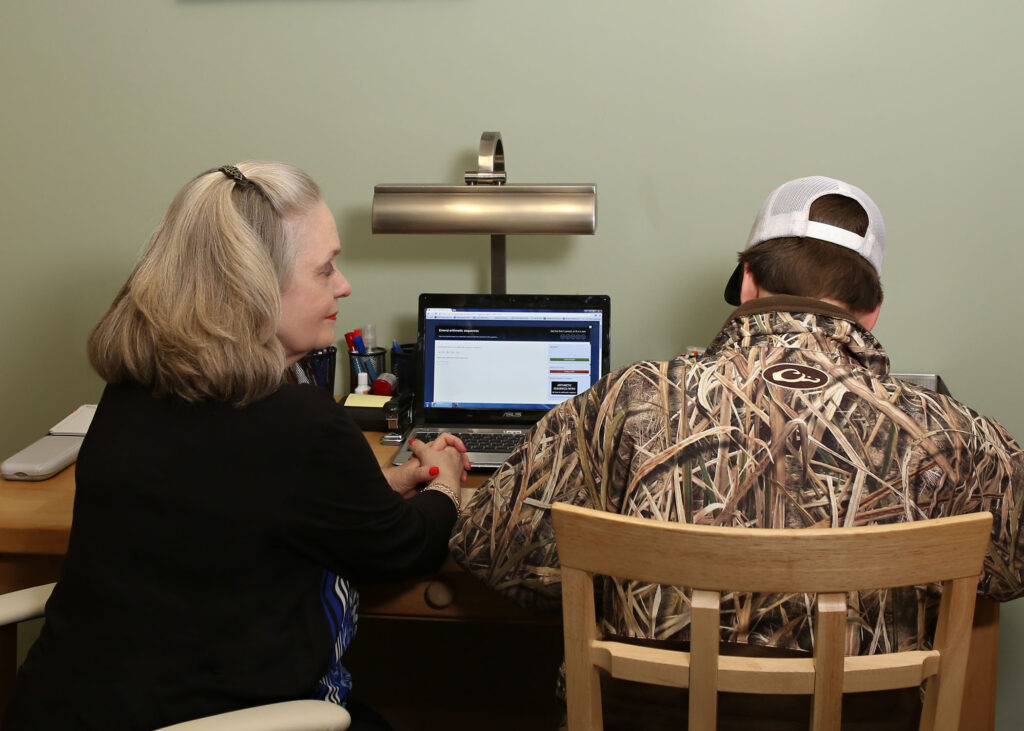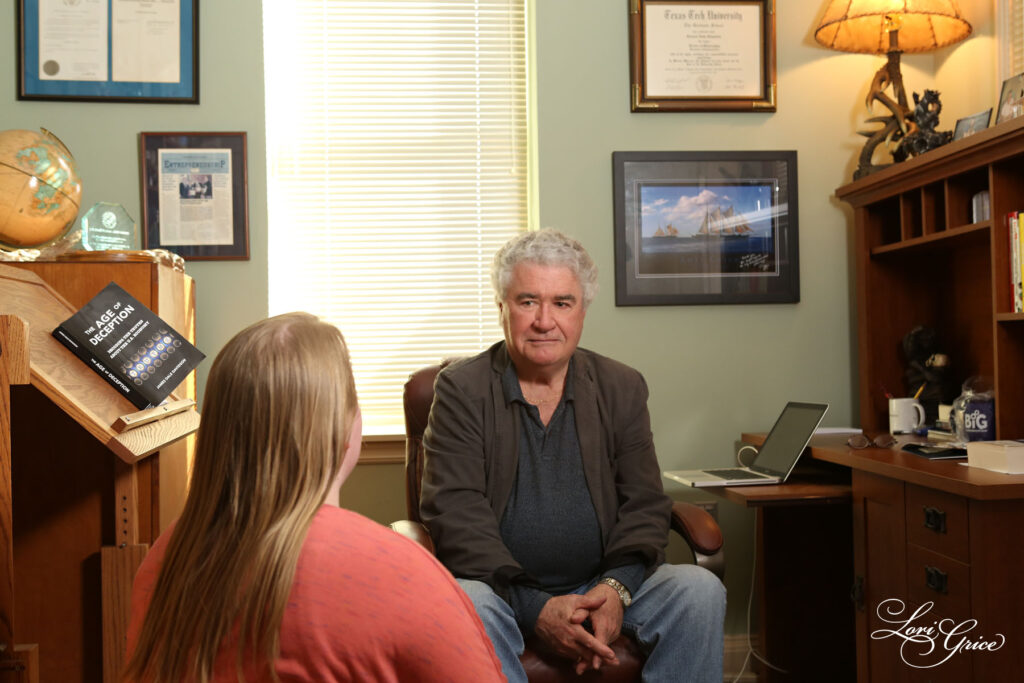

Debbye in action tutoring two tutorees at once

Learning mathematics with your tutor looking over your shoulder. Debbye has twice been voted the best math tutor in Statesboro.
Stapleton Learning Company
Established June 2005 by Deborah and Richard Stapleton
MATHEMATICS TUTORING FROM GRADE SCHOOL THOUGH GRADUATE SCHOOL
32 East Main Street
PO Box 2265
Statesboro, Georgia 30459
Cell phone Deborah: 912-687-1094
Cell phone Richard: 912-687-5049
Email: dstapleton@bulloch.net
Email: rjstapleton@bulloch.net
Website: www.effectivelearning.net
Deborah Coleman Stapleton, BSED, MED, EDS, MSOR is an emeritus assistant professor of mathematics at Georgia Southern University. She has an undergraduate degree in mathematics education from the University of Georgia, two masters degrees in mathematics education from Georgia Southern University, and a masters degree in operations research from Georgia Tech. She started out at the University of Georgia majoring in speech pathology, following the lead of her Aunt Tommie, Tommie Jean Corbett, at one time secretary to President Zack Henderson at Georgia Southern University, who became a professional speech pathologist counseling primarily children and young adults with learning difficulties.
Debbye was always relatively talented in mathematics, and she decided at the University of Georgia mathematics was her long suit, so she switched her major from speech pathology to become a math teacher. While teaching in Montgomery and Toombs County public schools near Vidalia she furthered her education in mathematics education driving to Statesboro for courses at Georgia Southern. At a later date she moved to Atlanta and lived with her Aunt Tommie while earning a masters degree at Georgia Tech in operations research, considering for a time pursuing a career in operations research in industry. After finishing her MSOR from Georgia Tech and interviewing a few corporations for operations research positions she decided the corporate life was not for her. She then came back to Georgia Southern and taught math in the mathematics and learning support departments.
After marrying husband Rick in 1989 and after the learning support department at Georgia Southern was discontinued she transferred to the Georgia Southern business school where she taught business statistics and decision science courses, and crunched the statistical numbers for quite a few research papers she co-authored with Rick through the years.
Debbye co-founded Stapleton Learning Company in June 2005 after retiring at Georgia Southern and has tutored students in mathematics subjects ranging from basic grade school arithmetic to college-level Calculus II. Most of her tutorees at Stapleton Learning Company have been high school students preparing for what lies ahead in university math courses and Georgia Southern students who have had difficulties in their math courses. She has tutored high school students taking courses in college prep math and college students taking math department courses in modeling, algebra, statistics, plane geometry, trigonometry and calculus. She has also tutored students taking courses in business school statistics, decision science, and operations management.
She quickly flunked out of retirement in 2005. In addition to teaching two modeling courses part-time each fall in the math department at Georgia Southern, she has been busy tutoring since 2005, generally from four to eight hours per day. Debbye’s tutorees do well in their math courses and are satisfied with the results of their one-on-one tutoring.
For information regarding Mrs. Stapleton’s hourly fee and schedule contact her at 912-687-1094, or dstapleton@bulloch.net.

Richard John Stapleton, BS, MBA, PhD, CTA is an emeritus professor of entrepreneurship, small business, and business policy at Georgia Southern University where he taught small business, operations management, organizational behavior, management information systems, control, entrepreneurship, business policy, and business ethics 37 years. He has a BS in economics, an MBA in organizational behavior, and a PhD in management science, all from Texas Tech University during 1962-1969. He received a professional certification in transactional analysis in 1978 from the International Transactional Analysis Association, a CTA (Certified Transactional Analyst). Richard trained and consulted using transactional analysis at the Southeast Institute at Chapel Hill, NC during 1975-1978.
He worked 10 years for his parents to age 21 in 1962 in their small businesses at Wolfforth, Texas, ten miles from Lubbock, started from scratch in 1950, including a lumber yard and hardware store, farms, ranches, a housing subdivision, a natural gas pipeline installation and service business, a farm irrigation and home water pump installation and service business, and a bank. He started and ran two businesses of his own at age 22–a weekly newspaper, the Wolfforth-Frenship Gazette, and Rick Stapleton Agency, a fire and casualty insurance agency, a real estate brokerage, and a mortgage loan brokerage–before returning to Texas Tech for graduate work at age 25, having decided to move on from his small hometown. He made a profit in his businesses, which he sold. He documented these experiences in his 2008 book, Business Voyages.
In addition to teaching a full load of courses every quarter or semester throughout his career at Georgia Southern from July 1970-June 2005 he supervised student teams consulting with over 300 small businesses in Southeast Georgia and directed a Small Business Institute 18 years. He has researched, written and published 47 refereed scholarly articles and 5 books. He founded the Entrepreneurship/Small Business Emphasis in the business school at Georgia Southern in 1987.
Since retiring from Georgia Southern and co-founding Stapleton Learning Company Richard wrote and published in 2008 Business Voyages, a 756-page summary of his life and experience, presenting what he considers the most relevant theories, concepts, techniques and learning processes anyone should know for coping with, surviving in, or succeeding in business worlds, primarily in small business worlds as an entrepreneur.
Sometimes called a business bible, Business Voyages is must reading for anyone thinking about making money as an entrepreneur starting with little capital, the major determinant of high incomes under capitalism.
Richard published in 2016 Born to Learn: A Transactional Analysis of Human Learning, a 245-page book explaining how people naturally learn, and what might be done to make timely changes, using transactional analysis concepts and models.
Born to Learn is must reading for teachers of all kinds, teachers in schools, parents in homes, managers in businesses, and many others.
Born to Learn will help anyone more fully understand how they came to learn what they naturally learned through experience. A unique feature of the book is the insight it provides into how people learn scripts in families and organizations and what is required to get along, survive, or succeed in organizations.
For information regarding any of the concepts and techniques in the “Running A Tight Ship” chapter of Business Voyages such as balance sheets, income statements, cash flow statements, break-even points, present value or business planning or concepts and techniques in the “People Along the Way” chapter of Business Voyages, or the transactional analysis content of Born to Learn contact Richard at 912-687-5049 or rjstapleton@bulloch.net.
In the process of writing Business Voyages, Richard became increasingly dismayed by political developments in the US since 1980 that worked to the advantage of rich CEO employees hired at the top of large corporations and to the disadvantage of small business owners and middle and lower income citizens. Small business people now have to worry about more than finding customers, hiring and training employees, and managing their cash flows; they also have to worry about politicians changing the rules of the game in favor of large public corporations.
Politicians not regulating greedy corporate money manipulators in Wall Street skyscrapers is one thing; it is another matter for politicians to increase the sales taxes of the poor and decrease the income taxes of corporations and the elite rich, thereby reducing aggregate demand for goods and services sold by small businesses on Main Streets, as has happened since 1980.
Anyone could see the remains of small businesses in downtown areas and in malls in towns and cities that were shut down and discontinued after 2007; and there is a significant risk if politicians in most states up to the present time increase the sales taxes of the poor and decrease the income taxes of the rich while they cut state expenditures they will continue to decrease aggregate consumer demand to the point that a new wave of small business discontinuances will result, creating higher unemployment and more Mad Hatter-like demonstrations, diatribes and threats on town squares, on talk radio, and on Fox (so-called) News. These issues are discussed in depth and detail in Business Voyages.
Business knowledge is not like mathematical knowledge. Math is hard because there are right answers you have to find that are provably true using deductive logic. Most business courses are considered easier than math courses because students do not have to work problems that are provably true. Unfortunately the real world is not cut and dried. Almost never can you prove anything is true in business or politics. The causes of real world problems are many, obscure and diverse, and most people have no way of proving what is causing what, causing them to live in a befuddled state making them susceptible to being exploited by whatever stories and lies unethical politicians and business communicators tell them.
One answer about the economy however seems clear.
It has become harder and harder for most small business owners to make a profit and stay in business in the US since Ronald Reagan’s time in 1981 thanks to the machinations of large corporations and their political lapdogs, paying politicians to cut their taxes, outsourcing jobs to low wage countries, and the like; and the way to deal with this pernicious predicament is to educate all voters to help them separate fact from fantasy, form from substance and truth from lies, to better understand what is in their interests and in the interests of all people, not merely the elite rich. At the same time, central banks of all developed nations, especially in the US, have resorted to expanding their money supplies in the form of debt by simply adding digits to bank accounts, flooding Earth with debt that has to be paid back, a process that slowly but surely sucks the blood out of real main street economies as debtors attempt to pay back their loans, siphoning money out of the system into the hands of creditors who issued the debt.
The above process worldwide has caused a process since 1980 that has resulted in the top ten percent of the human population owning and controlling about eighty percent of Earth’s wealth and resources resulting in extreme income inequality, which continues to worsen year after year. Consequently humans now live under a Sword of Damocles waiting for the next financial crisis or the next political or military catastrophe, having to worry all the while about the possible consequences of climate change.
What the world needs now is better informed and educated voters who will elect better politicians who will pass better rules and laws. How to produce this learning is one of the most pressing problems of our time. What is needed are more and more public forums where adults can discuss relevant issues in face-to-face dialectical discussions. Read Born to Learn for insights into how such processes work. Good discussions should be Game-free, that is, devoid of psychological Games. Born to Learn shows how to conduct Game-free discussions, a skill sorely needed by one of the most Game-infested groups on Earth, the US Congress.
See Inside the Book at Amazon.com for the Table of Contents and content samples of Born to Learn.
Most people think most small business owners are as rich as rich CEO employees hired by large corporations, when in reality there is a big difference between small business and big business. Most small business owners make about as much money as the average lower-level employee of a large corporation. According to William J. Dennis, Jr. of the National Federation of Independent Business Research Foundation, in 2007 the median income of owners of small employing businesses was about $72,500; and 6 percent earned less than $12,500, when only 5 percent earned more than $250,000 (NFIB Small Business Facts, Vol. 7, Issue 7, 2007).
The actual median income of CEOs of some 5,000 large public corporations in the US is hard to find, caused by the way large public corporations determine executive compensation, whether in salary, bonuses, stock options, etc. Regardless, it’s safe to say the compensation of most hired CEO employees in large public corporations in the US is over $2,000,000 per year. Some say the average compensation of CEOs of the largest corporations in the US is about $12,000,000 per year, making them salaried oligarchs.
Do these corporate oligarchs really do this much valuable work? Do they work harder and longer than most people? Enough harder and longer to justify their salaries? Are they intelligent and knowledgeable enough to justify their salaries? Most of them are good politicians, skilled at bonding with cronies, which gives them power to negotiate and set their high salaries. Power not work or productivity is the source of their high incomes.
Large corporations are as much public utilities as businesses since the actual stock owners in most cases are clueless about how to run them, and could care less so long as their stock price goes up; and many are too big to fail, so why not regulate them in the public interest, including the compensation packages of their top employees?
Why should the hired CEO employees of large US public corporations be paid ten to fifty times more per year than the elected President of the United States, the Chief Executive of about 3 million civil service workers and the Commander in Chief of about 2.25 million military workers?
Who should govern whom? The corporate oligarchs the US government, or the US government the corporate oligarchs?
It’s not that the president of the United States is underpaid. Most corporate CEOs in the US are overpaid. Vote in politicians with strong characters and a clear sense of ethics who will vote for we the people of the US rather than large corporations and the elite rich.
Get rid of Citizens United of 2010, the abominable 5-4 right wing US Supreme Court decision that legalized the spending of unlimited sums of money by large corporations and the elite rich to bribe politicians to lower their taxes and legalize them favors in business markets.





One thought on “STAPLETON LEARNING COMPANY”
Comments are closed.